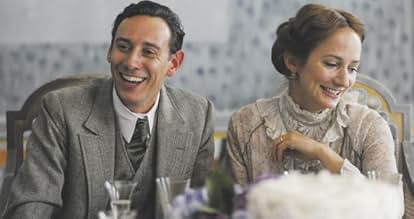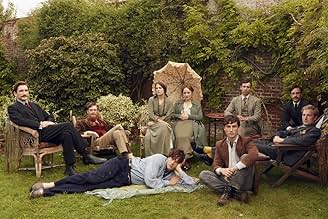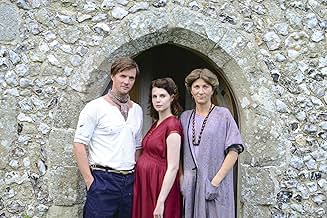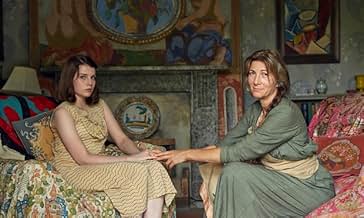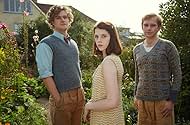Füge eine Handlung in deiner Sprache hinzuAn intimate and emotional drama for BBC Two about the revolutionary Bloomsbury group.An intimate and emotional drama for BBC Two about the revolutionary Bloomsbury group.An intimate and emotional drama for BBC Two about the revolutionary Bloomsbury group.
Folgen durchsuchen
Empfohlene Bewertungen
It's part two of Life in Squares tonight about the Bloomsbury Group and Virginia Woolf on BBC2 tonight at 21.00. In the first episode we romped through nearly ten years and saw how the embryonic group grew out of some Cambridge male graduates in the modern Bohemian squares of Bloomsbury. They were young free and single and OK. for money and everything was exciting. We saw how the complex relationships of Vanessa (nee Stephen) Bell, Virginia (nee Stephen) Woolf and the death of Thoby Stephen who brought the group together for their Thursday evening meetings. Painter Vanessa Stephen and her writer sister Virginia embarked on a life of unexpected and emerged from the whaleboned strictures of Victoria England. It was a remarkably accurate portrayal and covered a lot of ground in a short hour long program. I loved the lighting and treatment of some difficult subjects which set up tonight's second episode for an exciting continuation.
I TRIED (I really did) with the first episode of LIFE IN SQUARES but after twenty minutes my brain started to dig a tunnel through my spine and tried to escape the UTTER TEDIUM of this smug little series. Worse, the episode moved with all the speed and urgency of a glacier, unlike my brain digging the escape tunnel.
It was like being trapped in a room with a gang of self-regarding teenage Hipsters and Emos all moving in slow motion because of clinical depression.
Frankly (and this is rare) I gave up after that twenty minutes and I won't be returning.
Were the Bloomsbury Set a significant collection of artistic types who paved the way for the freedoms we enjoy today or a bunch of tedious and ultimately irrelevant posers only of interest to similar posers who write long serials for the BBC? Discuss.
It was like being trapped in a room with a gang of self-regarding teenage Hipsters and Emos all moving in slow motion because of clinical depression.
Frankly (and this is rare) I gave up after that twenty minutes and I won't be returning.
Were the Bloomsbury Set a significant collection of artistic types who paved the way for the freedoms we enjoy today or a bunch of tedious and ultimately irrelevant posers only of interest to similar posers who write long serials for the BBC? Discuss.
Life In Squares
It was a dreadful rambling mess that just amounted to self-indulgence. The lives of the Bell's and the Woolf's was just so tedious and yet we had no sense of all the work they did and the money they made opening companies and creating books, paintings and designs.
With regard to their "shocking" lives, perhaps unconventional for the time but surely not for a group of artists. It was a really nothing more than commune living.
We spent half our time trying to work out who was who as we had two sets of actors playing the parts of the characters at different ages. The script was clunky and the emotions, at best, superficial.
I'm giving this a 4 outta 10, but my advice skip the whole series as it was rubbish!
It was a dreadful rambling mess that just amounted to self-indulgence. The lives of the Bell's and the Woolf's was just so tedious and yet we had no sense of all the work they did and the money they made opening companies and creating books, paintings and designs.
With regard to their "shocking" lives, perhaps unconventional for the time but surely not for a group of artists. It was a really nothing more than commune living.
We spent half our time trying to work out who was who as we had two sets of actors playing the parts of the characters at different ages. The script was clunky and the emotions, at best, superficial.
I'm giving this a 4 outta 10, but my advice skip the whole series as it was rubbish!
This series is a remarkable portrait of the Bloomsbury group, and the large cast is universally excellent. The sexual radicalism of many of the characters is handled in a way that is very explicit but also sensitive. One imagines that some viewers would find some of the scenes shocking, especially those involving Duncan Grant's sexual relationships with other men.
But the writers and artists in the Bloomsbury group were all about disregarding the constricting social norms of early 20th century England, so it is appropriate that this series contains some graphic scenes and images.
The photography is very artistic and evocative, and it suggests Vanessa Bell's modernist perspective as an artist. Vanessa is at the heart of the drama, and her character is fully developed and very nuanced. Her love for the gay painter Duncan Grant, superbly played by James Norton, is perhaps the most poignant of all the romances that are shown here.
I wish more attention had been paid to Virginia Woolf who was, after all, the most significant and most brilliant of the Bloomsbury group. Her emergence as a novelist, the woman who became England's greatest novelist of her era, is glossed over. But the series is so unusually in its atmospheric depiction of the lives of these various free spirits that Virginia not getting enough attention can be forgiven.
I would definitely like to see more series about authors and artists whose lives defied social conventions.
But the writers and artists in the Bloomsbury group were all about disregarding the constricting social norms of early 20th century England, so it is appropriate that this series contains some graphic scenes and images.
The photography is very artistic and evocative, and it suggests Vanessa Bell's modernist perspective as an artist. Vanessa is at the heart of the drama, and her character is fully developed and very nuanced. Her love for the gay painter Duncan Grant, superbly played by James Norton, is perhaps the most poignant of all the romances that are shown here.
I wish more attention had been paid to Virginia Woolf who was, after all, the most significant and most brilliant of the Bloomsbury group. Her emergence as a novelist, the woman who became England's greatest novelist of her era, is glossed over. But the series is so unusually in its atmospheric depiction of the lives of these various free spirits that Virginia not getting enough attention can be forgiven.
I would definitely like to see more series about authors and artists whose lives defied social conventions.
Although I did not expect it, I found LIFE IN SQUARES to be a remarkable piece of television drama, offering insights into the lives of the Bloomsbury Group that I had never previously thought of.
The title is a clever one, suggesting the bourgeois existence of the Stephen sisters Virginia and Vanessa (played by Lydia Leonard, Eve Best, Phoebe Fox, and Catherine McCormack across the three-episode structure) where they grew up in luxury, but also denoting imprisonment, both mental and emotional. David Roger's production designs, with elegant rooms heavily over-stuffed with curios of all historical periods, restrict the actors' freedom of movement; they are forced to move round chairs, or negotiate too many ornaments. When the Bloomsbury Group meet for their regular soirées, they do so in small, confined rooms, with little room to breathe.
This kind of goldfish-bowl lifestyle inevitably has a significant effect on the Group's life-choices. While dedicating themselves to ideals of artistic purity that transcend the mundane concerns of early twentieth century Britain, we wonder whether that represents nothing more than a form of futile release from conformity. This is especially summed up in Vanessa Bell's checkered career; a talented artist in her own right, she becomes so much subject to her husband Clive's (Sam Hoare/ Andrew Havill's) bidding that she ends up losing her artistic will. She embarks on a long-term relationship with Duncan Grant (James Norton/ Rupert Penry-Jones), but finds little emotional satisfaction there - despite his undying devotion to her, he remains a professed homosexual.
Virginia experiences equal pains. We know from the start that she is mentally fragile, but it seems that her sister's overbearing nature, coupled with the prevailing ideology that all wives should have children at that time, pushes her into marriage with Leonard Woolf (Al Weaver. Guy Henry), Although the two enjoy a tranquil and often fulfilling life, it is not what Virginia wants. She tries to find solace in her writing, but even that is not enough to prevent her from committing suicide at the outbreak of World War II. From this drama, we get the sense of terrible sorrow that such an innovator should have felt so hemmed in by social and mental pressures that she should take her own life.
The sisters' existence does not change, even when they sacrifice London for the country, and Vanessa's family moves into Charleston, an idealized retreat still open to general visitors. Life there becomes even more claustrophobic, especially when Duncan's boyfriend David Garnett (aka Bunny) (Ben Lloyd-Hughes/ Jack Davenport) moves in. Vanessa is often forced into the role of unwilling peacemaker; at length she ends up doing something that she felt she must do, but ends up causing her lasting mental pain and suffering.
What makes LIFE IN SQUARES such a game-changing piece is that its sympathy extends to male and female characters alike. Would-be critics like Roger Fry (Elliott Cowan) are trying to make their way in the world as they pronounce on the effect of Modernism on the post-1918 universe, but they appear to lack the conviction to do so. This is chiefly due to their environment; the hothouse world of London (and provincial) society is so insulated from from worldly affairs that it ends up feeding on itself.
Brilliantly directed by Simon Kaijser from a script by Amanda Coe, LIFE IN SQUARES offers important material for reflection on the power as well as the limitations of the imagination, and how we must remain mindful of ourselves and our well-being rather than subjecting ourselves to the often restrictive dictates of prevailing socio-economic convention.
The title is a clever one, suggesting the bourgeois existence of the Stephen sisters Virginia and Vanessa (played by Lydia Leonard, Eve Best, Phoebe Fox, and Catherine McCormack across the three-episode structure) where they grew up in luxury, but also denoting imprisonment, both mental and emotional. David Roger's production designs, with elegant rooms heavily over-stuffed with curios of all historical periods, restrict the actors' freedom of movement; they are forced to move round chairs, or negotiate too many ornaments. When the Bloomsbury Group meet for their regular soirées, they do so in small, confined rooms, with little room to breathe.
This kind of goldfish-bowl lifestyle inevitably has a significant effect on the Group's life-choices. While dedicating themselves to ideals of artistic purity that transcend the mundane concerns of early twentieth century Britain, we wonder whether that represents nothing more than a form of futile release from conformity. This is especially summed up in Vanessa Bell's checkered career; a talented artist in her own right, she becomes so much subject to her husband Clive's (Sam Hoare/ Andrew Havill's) bidding that she ends up losing her artistic will. She embarks on a long-term relationship with Duncan Grant (James Norton/ Rupert Penry-Jones), but finds little emotional satisfaction there - despite his undying devotion to her, he remains a professed homosexual.
Virginia experiences equal pains. We know from the start that she is mentally fragile, but it seems that her sister's overbearing nature, coupled with the prevailing ideology that all wives should have children at that time, pushes her into marriage with Leonard Woolf (Al Weaver. Guy Henry), Although the two enjoy a tranquil and often fulfilling life, it is not what Virginia wants. She tries to find solace in her writing, but even that is not enough to prevent her from committing suicide at the outbreak of World War II. From this drama, we get the sense of terrible sorrow that such an innovator should have felt so hemmed in by social and mental pressures that she should take her own life.
The sisters' existence does not change, even when they sacrifice London for the country, and Vanessa's family moves into Charleston, an idealized retreat still open to general visitors. Life there becomes even more claustrophobic, especially when Duncan's boyfriend David Garnett (aka Bunny) (Ben Lloyd-Hughes/ Jack Davenport) moves in. Vanessa is often forced into the role of unwilling peacemaker; at length she ends up doing something that she felt she must do, but ends up causing her lasting mental pain and suffering.
What makes LIFE IN SQUARES such a game-changing piece is that its sympathy extends to male and female characters alike. Would-be critics like Roger Fry (Elliott Cowan) are trying to make their way in the world as they pronounce on the effect of Modernism on the post-1918 universe, but they appear to lack the conviction to do so. This is chiefly due to their environment; the hothouse world of London (and provincial) society is so insulated from from worldly affairs that it ends up feeding on itself.
Brilliantly directed by Simon Kaijser from a script by Amanda Coe, LIFE IN SQUARES offers important material for reflection on the power as well as the limitations of the imagination, and how we must remain mindful of ourselves and our well-being rather than subjecting ourselves to the often restrictive dictates of prevailing socio-economic convention.
Wusstest du schon
- WissenswertesAl Weaver who plays, Leonard Woolf also plays a character named Leonard in Grantchester.
Top-Auswahl
Melde dich zum Bewerten an und greife auf die Watchlist für personalisierte Empfehlungen zu.
- How many seasons does Life in Squares have?Powered by Alexa
Details
- Erscheinungsdatum
- Herkunftsland
- Sprache
- Auch bekannt als
- Жизнь в квадратах
- Drehorte
- Produktionsfirmen
- Weitere beteiligte Unternehmen bei IMDbPro anzeigen
- Farbe
- Seitenverhältnis
- 1.78 : 1
Zu dieser Seite beitragen
Bearbeitung vorschlagen oder fehlenden Inhalt hinzufügen


